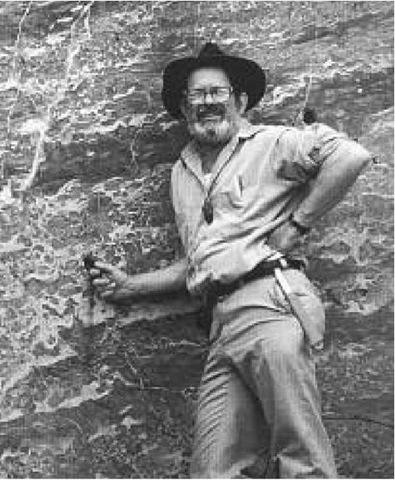(1925- ) American Sedimentologist, Archaeological Geologist
Robert Folk became interested in classifying sedimentary rocks as a boy admiring his rock collection because the igneous rocks had such exotic names and the sedimentary rocks did not. Their names, sandstone, limestone, shale, were boring. He decided even then that he would remedy the situation and after his years at college, he did just that. If he had done nothing else with his career, Robert Folk would still be remembered for his classification system for carbonates, which still appears in many textbooks more than 40 years later, as well as a definitive textbook on sedimentology from about the same time. However, this work barely scratches the surface of a very successful career.
Robert Folk in a marble quarry in Lipari, Italy
In addition to much more extensive work on carbonate deposition, Folk also became interested in Aeolian deposits. He researched grain roundness and coloring of sand in the Simpson Desert in Australia. He similarly investigated pebble shapes in rivers and on beaches in Tahiti. He then turned his attention to archaeological geology. He did research on environmental geology of classical Macedonia, limestone used in construction of the pyramids, and the archaeological geology of Israel, and especially Galilee. He located sources for building materials, isotopically determined the ages of mortar in structures, and determined how iron smelting was carried out in ancient Israel. He even began investigating how the ancient ruins were deteriorating.
An unquenchable love for Italy led to the discovery that bacteria mainly constructed Roman hot-water travertine (a kind of limestone in springs). Work on these rocks with the Scanning Electron Microscope (SEM) led to the discovery of dwarf bacteria (nannobacteria). About 10,000 of them will fit on a pinhead. He published on the topic with papers like “Nannobacteria in the Natural Environment and in Medicine” to little fanfare or even notice. Nonetheless, Folk began a full research program on the role of nannobacteria in both sedimentary and weathering processes. Then came the announcement by NASA that they may have found nannobacteria in Martian meteorites. The question as to whether there was life on Mars captivated the imagination of the public. Now Folk finds himself in the middle of a controversy and a frenzy of research and publication on terrestrial rocks, Martian meteorites, and human nannobacterial diseases.
Robert Folk was born on September 30, 1925, in Cleveland, Ohio. He graduated from Shaker Heights High School and enrolled in Pennsylvania State University in College Park in 1943. He earned all of his degrees at Penn State, including a bachelor of science degree in 1946, a master of science degree in 1950, and a Ph.D. in 1952. His adviser for all of his research was Paul Krynine, but he also spent a year at Columbia University, New York. He married Marjorie Thomas in 1947, and they had three children. He has enlisted them as field assistants on several projects. At the end of his graduate career he accepted a position as a geologist for Gulf Research and Development Co. in Houston, Texas, and Pascagoula, Mississippi. In 1952, Folk joined the faculty at the University of Texas at Austin and remained there for his entire academic career. He held several endowed chairs in the department including the Gregory Professorship in sedimentary geology (1977-1982) and the Carlton Professorship of geology (1982-1988). He retired as a professor emeritus in 1988 as well as accepting a position of senior research scientist at the Texas Bureau of Economic Geology, Austin. He was a visiting professor several times during his career at the Australian National University in Canberra (1965), at Universita degli Studi in Milan, Italy (1973), and at Tongji University in Shanghai, China (1980).
Robert Folk has led a very productive career authoring more than 100 articles in international journals and professional volumes. Many of these articles are definitive works on carbonate petrology. He also wrote a successful textbook entitled, Petrology of Sedimentary Rocks, with six printings between 1957 and 1980. His research contributions and teaching ability have been well recognized by the profession as evidenced by his numerous honors and awards. For teaching, he received The Geology Foundation Outstanding Teacher Award and the Carolyn G. and G. Moses Knebel Distinguished Teaching Award, both from the University of Texas, the Neil Miner Award from the National Association of Geology Teachers (1989), and the Distinguished Educator Medal from the American Association of Petroleum Geologists (1997). For his research, Folk received three best paper awards from American Association of Petroleum Geologists, and Society of Economic Paleontologists and Mineralogists (SEPM). He was awarded the Twenhofel Medal from SEPM (1979), the Sorby Medal from the International Association of Sedimentologists (1990), and the Penrose Medal from Geological Society of America (2000).

